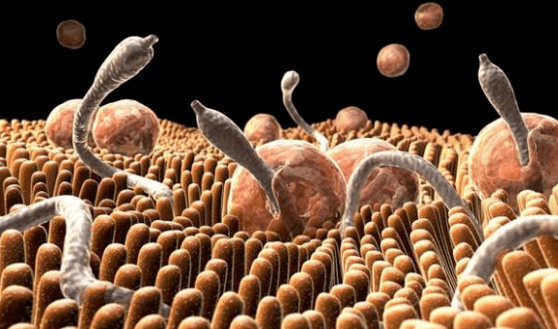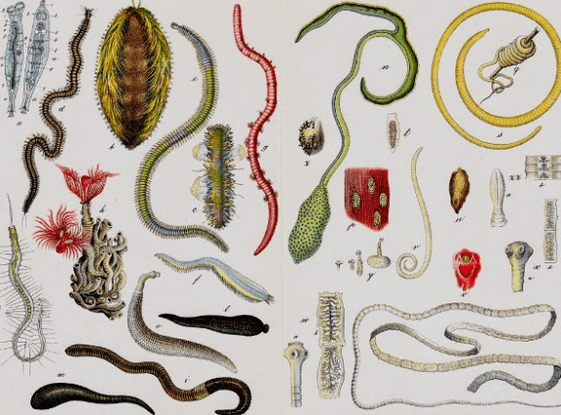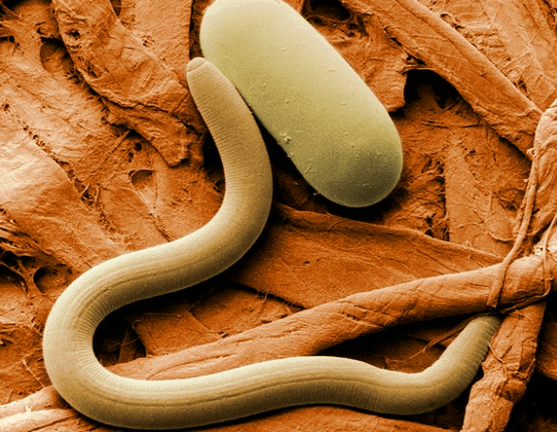Parasites are organisms that exist at the expense of the owner.Their vital activity in the human body can occur asymptomatic.Therefore, helminthic invasion is one of the most rarely diagnosed pathologies.

Parasitic diseases lead to serious consequences.According to the World Health Organization, they cause the death of 16 million people around the world.In order to timely detect the parasite and prevent complications, you should know about the possible ways of infection and symptoms.
Why are parasites dangerous?
Parasites can live both on the body and within a person.Some of their varieties are not dangerous, while others pose a serious threat to life.Helminest life products have a toxic effect.With a large accumulation, poisoning of the body occurs.
Symptoms of intoxication by parasites:
- vomit;
- weakness;
- loss of appetite;
- high body temperature;
- fever;
- Convulsions.
Treatment should begin on time, because a neglected condition can result in death.
The consequences of a parasitic infection differ depending on the localization of the parasite.Worms can cause an allergic reaction, blindness, paralysis, destroy the liver, lungs, brain, influence the work of other organs.They reduce immunity, which is why a person is more susceptible to infectious diseases.
The most dangerous parasites:
- Brain amoeba (tape).It lives in the brain, life expectancy of up to 20 years.As the ribbon grows, he seeks to kill his master.Mortality occurs in 97% of cases.The worm causes cerebral edema, and infection is possible when using infected meat or water.
- Askarids.Ring worms, which are often found in the body of the child.Adults grow up to 30 cm in length.Symptoms of general intoxication appear, and you can get infected through dirty hands.
- Onhocarcavelos.A worm that causes river blindness (onhocercosis).
- Trypanosoma.Causes chronic diseases of the heart and intestines.
- Australian tick.Provokes a strong allergic reaction, leads to respiratory failure.
General symptoms
The most common signs of parasites are allergic manifestations in the form of urticaria, skin itching, rashes, increasing body temperature and bouts of bronchial asthma.
General symptoms of Parasitosis in the body:
- nausea, vomiting;
- abdominal pain;
- violation of the stool (diarrhea or constipation);
- itching in the anus;
- grinding teeth in a dream;
- worsening appetite;
- headache;
- weakness, fatigue;
- avitaminosis;
- reduction of immunity;
- anemia;
- cough;
- articular or muscle pain;
- A sharp decrease or increase in body weight.
Symptoms may not appear immediately.For example, clinical signs when infection Pinworms appear after 2-3 days, and ascaris after 3 months.
Types of parasites
Parasites in the human body can live anywhere.Usually they can be detected in the intestines and liver, but they can parasitize in the lungs, muscle tissue, blood, blood vessels and brain.If the larva fell into the bloodstream, then it can attach to any internal organ, violating its functioning.
What parasites live in the human body?There are more than 250 species that can live at the expense of a person.Their dimensions vary from microscopic to meters, the number can also be different.
The main types of parasites in humans can be distinguished:

- Ectoparasites;
- helminths;
- Prostorships (protozoal).
Ectoparasites
This species lives on the skin.Representatives of ectoparasites:
- louse head, pubic and pay - pediculosis;
- bed bug is a carrier of infectious diseases such as hepatitis, tuberculosis, and abdominal typhoid;
- Demodex - demodecosis;
- scabies - scabies;
- Cochliomyia - Cochliomias.
Infection with parasites occurs in a contact-household way.They are transmitted with bodily contact, through personal hygiene items and clothes.Cochliomias occurs when flies that are common in North and Central America.
The simplest parasites
The following parasites belong to them:
- In the intestines - amoebas, giardia, leishmania, blastocysts, Blanditia;
- in the blood - tripanosomes, Babesia;
- in the organs of the genitourinary system - trichomonas;
- In the internal organs (heart, lungs, liver, brain) - toxoplasmes, tripanosomes, acanthamoebas.
Infection occurs through food, water, sexual intercourse (in the case of trichomonad).
Helminths
These are worms that in the process of their life violate the work of internal organs and metabolism.Worms can be only a few centimeters in length or reach 7-10 m.
With primary infection, they settled in the intestines, and with repeatedly, other organs and muscles can affect.Most often there are worms that live in the rectum, liver, bile ducts and lungs.
The most common diseases caused by parasites by helminths:
- Acaridosis.Larvae pass through the digestive tract and settle in the intestines.An adult reaches 25-30 cm.
- Opistorchoz.Adults affect the bile ducts, enter the human body along with infected fish.
- Cestodosis.The infection caused by tape worms occurs in a person through meat and fish, the intestines are affected.
- Shistosomosis.It is caused by saucers or flat worms.Infection occurs when the skin of water infected with freshwater snails enters.
This species includes a large number of subspecies.In total, more than 300 varieties of helminths are registered.
They can be grouped in 3 groups:
- Nematodes - round worms;
- Trematodes - saucers;
- Cestodes - ribbon worms.
Nematodes
The most striking representatives of round worms:
- pinworms;
- Askarides;
- Blacovyv.
The main ways of infection with helminths are the use of dirty products or contaminated water, unwashed hands, insect bites.Nematodes settle in the gastrointestinal organs, less often in the liver, lungs and heart.
The main symptoms of the presence of parasites in the human intestines:
- nausea, vomiting;
- itching in the anus;
- skin rashes;
- indigestion;
- Chronic fatigue.
With a large population, parasites come out of the body naturally.In this case, the nematod can be found in feces.
Trematodes
They lead to dangerous infectious diseases.These parasites, depending on the habitat, can be divided into such groups:
- Blood bars - schistosomes;
- Tremontodes of the liver - liver bicarries;
- intestinal saucers;
- pancreatic parasites;
- pulmonary loss.
Symptoms of infection depend on the affected organ.It can be weakness, dizziness, deterioration of appetite, nausea, stool disorders, pallor of the skin, irritability or apathy.
The main source of infection is to get excrement of sick animals or people into water and soil.
Cestodes
Ribbon worms live in the intestines.They fall into the human body when using the meat and fish insufficiently processed sufficiently treated.The greatest danger is pork chain, which can migrate into the bloodstream, muscle tissue and brain.
Cestodes can parasitize in the body for a long time without obvious signs, growing to impressive sizes.The length of the adult is up to 10 m. The common diseases caused by CESTODES, - vitellinus, echinococcosis.
Ordinary representatives of the cestodes:
- tape;
- bull and pork tapeworm;
- sheep cerebrum;
- echinococcus.
Which doctor to contact parasites?
Parasitic diseases are treated by doctors-Parasitologists.They need to be contacted with suspicion of infection.Also, a dermatologist can find parasites on the skin.
Diagnostics
Diagnosis of parasitic worms is carried out using a laboratory examination of feces.To determine the worms, you need to take the analysis three times.
The parasites of the cutters are detected by scraping, which is performed by adhesive tape.It is possible to check for parasites that do not participate in digestion, using a blood test or biopsy.
Treatment
You can cleanse the human body from parasites with the help of medicines and folk remedies.The duration of treatment depends on the degree of infection and intoxication of the body.
Drug treatment of parasites
Treatment of helminthiasis involves the use of anthelmintic agents.They are toxic, so it is impossible to use them without a confirmed diagnosis.Symptoms of helminthiasis are stopped using symptomatic treatment.Vitamin preparations, choleretic drugs, hepatoprotectors, laxative, anti -allergic medicines, antibiotics, probiotics are used.In severe allergic reactions, corticosteroids are prescribed.
Folk treatment of parasites
You can get rid of parasites in the human body with the help of such means of traditional medicine:
- Enema with cranberry juice.It helps to get rid of helminths and protozoa.For 2 liters of water, you need to take 2 tbsp.l.cranberry juice and 1 tbsp.l.salt.Do the procedure 2 times a day.
- Garlic enema.You can get rid of intestinal parasites in this way - boil 6 cloves of garlic in 1 liter of milk, cool and make an enema.
- Pumpkin seeds.Purified seeds (300 g) must be crushed, pour a small amount of water, add 100 g of honey.Eat in one appointment with a laxative.
- Onion infusion.Chop the large onion into pieces, pour boiling water, leave for 12 hours.Drink 100 g 3-4 times a day.

To remove parasites from the stomach and intestines, it is necessary to eat spicy foods.Using garlic, onions, sharp spices and spicy herbs, you can easily get rid of, for example, from pinworms.
Complications
Parasites negatively affect the human body.If helminthosis is not treated, severe complications occur:
- frequent SARS, an increase in adenoids and tonsils;
- appendicitis;
- enteritis, gastroenteritis, enterocolite;
- cirrhosis;
- liver cancer;
- anemia;
- gastrointestinal bleeding;
- pancreatitis;
- bronchitis;
- oncological diseases;
- cerebral edema;
- Purulent-septic lesions.
The vital activity of parasites in the abdomen leads to peritonitis, in the lungs - to pneumonia.Askarides clog the respiratory and bile ducts, provoke suffocation or intestinal obstruction.
Prevention
Preventive measures against infection with parasites:
- wash your hands before meals and after the street;
- use only washed vegetables and fruits, boiled water;
- store food in compliance with sanitary standards, avoid contact with flies;
- consume meat and fish only after heat treatment;
- Do not bathe in polluted reservoirs;
- Do not use other people's hygiene products;
- Carry out dejetting pets.
Although worms pose a threat to human health and life, the body cleanses the body only after the detection of parasites and under the supervision of a doctor.Timely diagnosis of helminthiasis will avoid severe complications.It is important to take preventive measures, especially in children.


















